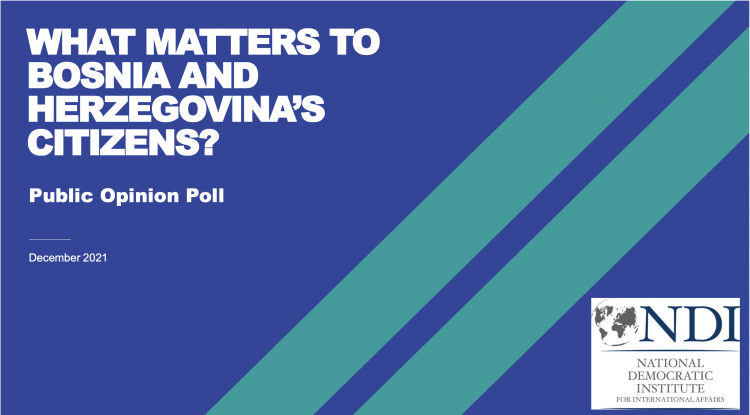Bosnia and Herzegovina Poll
A NDI statewide poll in Bosnia and Herzegovina (BiH), conducted in December 2021 found that a minority of respondents in Republika Srpska (RS) at 34%, support Bosnian Serb leader Milorad Dodik’s declared intention to withdraw the RS from state institutions, with 35% favoring RS independence. Forty-eight (48)% of RS respondents are against the withdrawal of the RS from state institutions, and 45% of RS respondents are against independence. Avoiding inter-ethnic violence (72%) and focusing on the economy (69%) were seen as more pressing than promoting Serb unity (49%).
The survey was fielded prior to the invasion of Ukraine and following the High Representative’s imposed amendments to the criminal code banning genodice denial and war crimes glorification. Polling data shows that 60% state-wide approve of the amendments, including 60% of Bosnian Serbs. A vast majority of respondents in the RS sees Dodik’s decision to boycott the BiH state parliament and leave state institutions as an act of retaliation against the High Representative’s actions. Around 75% sees no benefit to Dodik’s refusal to abide by the new laws.
“The research affirms what NDI sees on the ground. People throughout Bosnia and Herzegovina desire peace, prioritize economic development, and do not support ethnic division,” said Nenad Simovic, NDI/BiH Senior Resident Director, in Sarajevo. “They want the government to solve bread and butter issues such as corruption, unemployment, and giving young people opportunity.”
Approximately 90% feel BiH is moving in the wrong direction (compared to 85% in 2020). This rising dissatisfaction ties to economic concerns, political impasse, and corruption, which are top concerns.
Support for European Union (EU) membership is the broadest in years, at 85%,with a noticeable rise in Bosnian Serb support from 55% in 2020 to 64% in 2021. NATO accession remains divisive, with strong support from Bosniaks (90%) and Bosnian Croats (92%) and firm opposition from Bosnian Serbs (82%). The higher level of support for EU integration in the RS correlates with public reticence to digress from a path of economic development, social stability, and political integration.
Correlation between research data and voter turnout in the October 2022 general elections may be hard to predict, but there are perceptible shifts from previous NDI research that suggest the possibility of robust voter turnout, with 58% of respondents across all three main ethnic groups saying they will certainly vote. This correlated to 56% of Bosniaks, 63% of Bosnian Croats, and 60% of Bosnian Serbs.
NDI surveys public opinion to help BiH stakeholders address issues of public concern through responsive policies and governance. The poll carries an overall margin of error of +/-2%. NDI’s public opinion research work is made possible by the generous support of the American People through the United States Agency for International Development (USAID). The contents of this poll and analysis are the sole responsibility of NDI and Ipsos and do not necessarily reflect the views of USAID or the United States Government.
